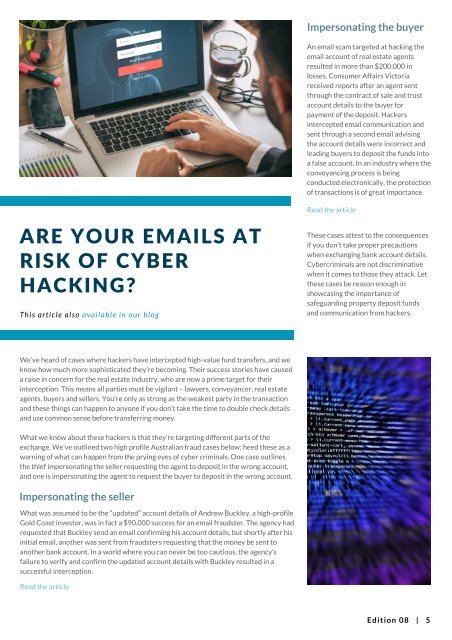Prac Playbook Edition 8
You also want an ePaper? Increase the reach of your titles
YUMPU automatically turns print PDFs into web optimized ePapers that Google loves.
Impersonating the buyer<br />
An email scam targeted at hacking the<br />
email account of real estate agents<br />
resulted in more than $200,000 in<br />
losses. Consumer Affairs Victoria<br />
received reports after an agent sent<br />
through the contract of sale and trust<br />
account details to the buyer for<br />
payment of the deposit. Hackers<br />
intercepted email communication and<br />
sent through a second email advising<br />
the account details were incorrect and<br />
leading buyers to deposit the funds into<br />
a false account. In an industry where the<br />
conveyancing process is being<br />
conducted electronically, the protection<br />
of transactions is of great importance.<br />
Read the article<br />
ARE YOUR EMAILS AT<br />
RISK OF CYBER<br />
HACKING?<br />
T h i s a r t i c l e a l s o a v a i l a b l e i n o u r b l o g<br />
These cases attest to the consequences<br />
if you don’t take proper precautions<br />
when exchanging bank account details.<br />
Cybercriminals are not discriminative<br />
when it comes to those they attack. Let<br />
these cases be reason enough in<br />
showcasing the importance of<br />
safeguarding property deposit funds<br />
and communication from hackers.<br />
We’ve heard of cases where hackers have intercepted high-value fund transfers, and we<br />
know how much more sophisticated they’re becoming. Their success stories have caused<br />
a raise in concern for the real estate industry, who are now a prime target for their<br />
interception. This means all parties must be vigilant – lawyers, conveyancer, real estate<br />
agents, buyers and sellers. You’re only as strong as the weakest party in the transaction<br />
and these things can happen to anyone if you don’t take the time to double check details<br />
and use common sense before transferring money.<br />
What we know about these hackers is that they’re targeting different parts of the<br />
exchange. We’ve outlined two high profile Australian fraud cases below; heed these as a<br />
warning of what can happen from the prying eyes of cyber criminals. One case outlines<br />
the thief impersonating the seller requesting the agent to deposit in the wrong account,<br />
and one is impersonating the agent to request the buyer to deposit in the wrong account.<br />
Impersonating the seller<br />
What was assumed to be the “updated” account details of Andrew Buckley, a high-profile<br />
Gold Coast investor, was in fact a $90,000 success for an email fraudster. The agency had<br />
requested that Buckley send an email confirming his account details, but shortly after his<br />
initial email, another was sent from fraudsters requesting that the money be sent to<br />
another bank account. In a world where you can never be too cautious, the agency’s<br />
failure to verify and confirm the updated account details with Buckley resulted in a<br />
successful interception.<br />
Read the article<br />
E d i t i o n 0 8 | 5




